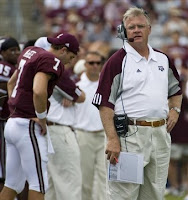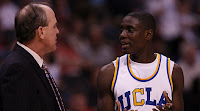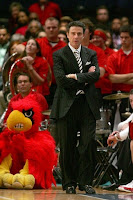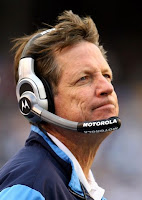
One of my former college roommates forwarded me an
excellent article that has real relevance for coaches, especially those who are taking over a team or program.
As I read the article, I kept thinking about coaches at all levels who've been hired and achieved success immediately.
Paul Johnson at Georgia Tech (pictured here), for example, comes to mind.
According to the authors, one "essential element that must exist before any process change can show significant results." That element is
confidence.
"Leaders who inspire confidence find that [players] become partners, and invest time, energy and effort toward the desired end result."
The following is an excerpt from the article [
which is here]:
Ultimately, what determines whether a new leader will be able to meet expectations is the motivation and effort of the [team]. While a great reputation may give the new leader a brief advantage, it’s the ability to inspire the willing contribution of [his players] that enable him or her to deliver results rapidly and sustain these results over time.
When people have confidence, they willingly invest their time, effort, and energy toward the end result. New leaders can get better results, and get them more quickly, by making confidence-building a central focus of their transition plan.
But this doesn’t mean they start out with a pep rally.
The kind of confidence people need doesn’t come from impassioned speeches or from patting people on the back and letting them know you have faith in them, but from a carefully crafted plan that guides people toward early successes and inspires them to ever higher levels of performance.
As Rosabeth Moss Kanter found in her research for her book,
CONFIDENCE, once an organization is on a “winning streak,” it takes relatively little effort to sustain performance. So it makes sense for new leaders to
focus their initial efforts on early successes. These successes inspire people in the organization to have confidence in the leader, in each other and in their own ability to win.
So how do new leaders rapidly build confidence?
While every organization is different, and every new leader will face unique circumstances, the good news is that
any leader in a new role can rapidly encourage confidence by implementing the five building blocks:
- Building trust through frequent, candid, and consistent communication.
- Getting buy-in for one overriding and inspiring objective.
- Creating a plan with input from the organization.
- Ensuring that people are in the right roles.
- Achieving early successes that inspire.
COMMUNICATION: As a new leader, know that everything you do communicates something. The messages people get from your early actions impact the confidence they will have in your leadership.
A great way to build credibility and mark the beginning of your leadership is by solving simple problems that get in people’s way.The best way to determine which small changes will have the biggest impact is to get out and talk to people. When you decide on the changes to make, make them quickly and publicly.
People need to trust your motivations and feel confident that you’ll keep your word. The more exposure they have to you and the more you show interest in their concerns, the more likely you are to build trust.
INSPIRING VISION: Far too many leaders are great at giving specific directions, but neglect to remind everyone on the team of the greater direction and vision of the company.
But offering a strategy without a meaningful goal is like providing a map, pointing out a direction and telling people to “just get started” and you’ll fill them in later on the destination.
The journey quickly becomes meaningless, and if the travelers encounter any roadblocks or detours, they’re likely to just give up, since they don’t know the greater purpose.
People are goal-directed organisms. Providing a meaningful objective taps into people’s natural motivation to succeed. As a new leader,
you need to rapidly identify your prime objective for the first part of your tenure and get buy-in from all stakeholders. For any goal to inspire team confidence, it must truly be shared by everyone.
When people are confident of the clear, overriding purpose for their activities, they can respond flexibly, rapidly and confidently to unanticipated obstacles, changing circumstances and new
opportunities.
As a leader, you need to
take responsibility for keeping people connected to the direction and vision on a regular basis. This keeps people from getting lost in daily activities and losing momentum.
STRATEGIC PLAN: No coach who wants to inspire the confidence of the team is going to suggest they can win without a clear game plan. In the same way, you can’t expect your players to get out on the field without a strategy.
Can the plan change along the way? Of course. But
it’s having a plan – a roadmap for action – that inspires players to get out on the field and get started.
It’s important to engage people in developing the strategy. Not only will you gain valuable information, but you’ll increase people’s feeling of
ownership in the plan. When people participate in creating a plan, they feel more invested in bringing it to a successful outcome.
Every milestone, program, and initiative needs to move the organization in the direction you want it to go. And everyone in the organization needs to be aware of how his or her role fits into the larger objective.
CLEARLY-DEFINED ROLES: By ensuring that the right people are in the right roles, you, as a leader, can feel more confident in them. Putting people in roles that fit their competencies also increases their self-confidence and the confidence of others on the team.
In order to do this, you need to:
--
Evaluate: See that the right people are in the right jobs. Support those who are, move those who are not.
--
Coach: Guide, critique, and assist people to improve their performance.
--
Build: Encourage and recognize people regularly. Specific encouragement and reward gives your people the courage to stretch, take risks and achieve new levels of performance.
Don’t wait for scheduled meetings, reviews, or ceremonies to give people feedback and recognition.
Every interaction you have with your team is an opportunity to energize people and encourage them to move them in the right direction.
EARLY VICTORIES: It’s important that people feel momentum building during the transition period. The best way to accomplish this is to focus people on achieving early wins. It’s important to avoid initial challenges that carry the risk of failure and instead identify goals that can be achieved within a short time frame.
Seeing tangible results boosts motivation and encourages further effort. Leaders need to identify milestones that lead the organization in the direction of the overriding objective. Achieving these milestones constitutes early wins and gives the organization and leadership team something to celebrate.
Achieving these early victories builds the leader’s credibility, the organization’s motivation, and the team’s confidence in its own ability to win.
Not only do you need to identify milestones and create a path to achieve them, you also need to celebrate victories, even the small ones, from the very beginning.
Celebrating not only creates an atmosphere of recognition and positive energy, it bonds your team members together in the spirit of shared accomplishment. This inspires further confidence in their ability to collaborate and to win.
In any transition, getting the beginning right is critical to achieving the end results you want. As you move into a new leadership position, you’ll have many things to do. You’ll find yourself pulled in multiple directions, needing to respond to multiple stakeholders and outside observers, often at the same time.
Keep in mind, however, that
confidence is the driving force enabling you to deliver on expectations.
No priority is more important than building that confidence. The sooner you master this, the sooner your strategic plans are likely to deliver on their promise.
 Coaches have different opinions on whether to hold practice on a holiday.
Coaches have different opinions on whether to hold practice on a holiday.






































